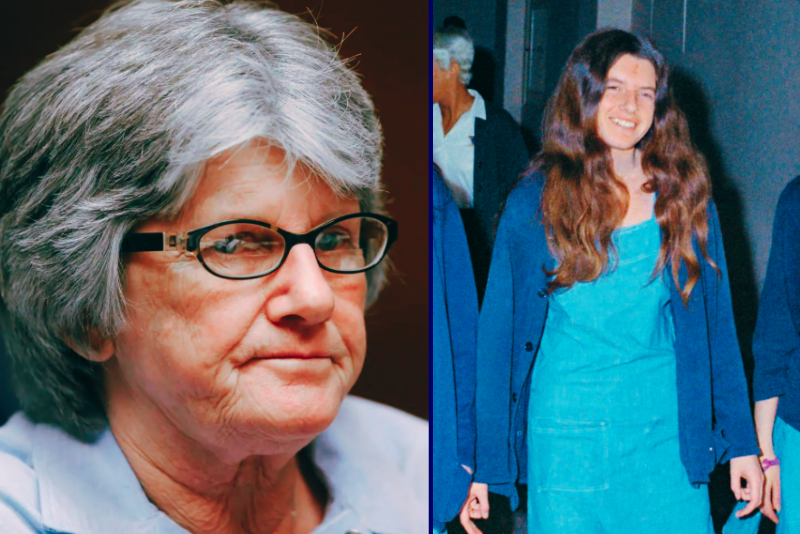
OAN Staff Brooke Mallory
6:33 PM – Thursday, October 16, 2025
California Democrat Governor Gavin Newsom has once again denied parole to Patricia Krenwinkel, a former follower of cult leader Charles Manson and one of the perpetrators of the infamous 1969 Tate-LaBianca murders.
This is the second time that Newsom (D-Calif.) has overruled a parole board’s recommendation for her release, the first being in 2022. They recommended her release for a second time nearly five months ago.
Krenwinkel, now 77, was convicted of seven counts of first-degree murder for her role in the killings, which included the murder of pregnant actress Sharon Tate. She has been incarcerated since 1971 and is currently the longest-serving female inmate in California — having spent over 54 years behind bars.
Over the decades, Krenwinkel has pursued degrees, maintained a clean prison record, and expressed remorse for her crimes, according to the parole board. Her legal team has also highlighted her personal transformation, labeling her a low risk to society, while emphasizing “the abuse she suffered” under Manson’s control. A 2017 investigation acknowledged her history of victimization, supporting her rehabilitation efforts.
Despite these factors, Governor Newsom concluded that Krenwinkel still poses an “unreasonable danger to society.”
In his decision, he cited her limited insight into her past actions and a tendency to externalize blame, arguing that her rehabilitation is outweighed by lingering psychological deficits. He also acknowledged her age and the circumstances surrounding the original crimes — but still asserted that public safety must remain the priority.
Krenwinkel’s attorney, Keith Wattley, slammed the decision as being politically motivated, arguing that it disregarded substantial evidence of her rehabilitation. He pointed to her eligibility under youth, elderly, and domestic violence-based parole laws, emphasizing that she has served decades of her sentence and has demonstrated genuine reform.
The decision has reignited debate over the balance between justice and rehabilitation. Advocates for Krenwinkel’s release argue that she has earned a second chance after decades of incarceration and personal growth, while opponents stress the severity of her crimes and the lasting impact on the victims’ families.
As of now, Krenwinkel will remain behind bars, continuing her sentence in a California correctional facility.
Krenwinkel first met Charles Manson in Manhattan Beach in 1967, alongside Lynette “Squeaky” Fromme and Mary Brunner. In later interviews, Krenwinkel said she had a sexual encounter with Manson the very first night they met and described him as the first person to ever tell her that she was beautiful. “Captivated by his charisma and seeking attention,” she left her apartment, car, and last paycheck behind to follow Manson and others to San Francisco.
As a key participant in the brutal murders at 10050 Cielo Drive on August 9, 1969, where actress Sharon Tate and four others lost their lives. Court records confirm Krenwinkel stabbed a woman and called for Charles “Tex” Watson to join the attack. During her trial, she chillingly admitted, “I stabbed her and kept stabbing her,” describing the act as feeling like “nothing… it was just there, and it was right.”
The next night, Krenwinkel joined Manson, Watson, Susan Atkins, Leslie Van Houten, Clem Grogan, and Linda Kasabian, who referred to themselves as “the family,” in the murders of Leno and Rosemary LaBianca.
At her 2016 parole hearing, Krenwinkel recounted her role in the LaBianca killings, admitting she stabbed Rosemary while fixated on the belief that Leno, the husband, now “wouldn’t be sending his children to war.”
The LaBiancas were not specifically chosen for personal reasons but were victims of Manson’s chaotic plan to ignite “Helter Skelter,” his idealized vision of a race war inspired by his own interpretation of The Beatles’ music. After the Tate murders, Manson sought to continue the killing spree to escalate societal panic. As a middle-class couple living in Los Angeles’ Los Feliz neighborhood, the couple were targeted largely because their home was familiar to Manson. He had previously attended a party at a neighboring house and was aware of the area, making their residence a convenient choice. However, to Manson, the LaBiancas also symbolized the “establishment” he despised, and Krenwinkel later stated during her 2016 parole hearing that she believed the murders would disrupt societal norms — aligning with Manson’s anti-government rhetoric.
Stay informed! Receive breaking news alerts directly to your inbox for free. Subscribe here. https://www.oann.com/alerts
What do YOU think? Click here to jump to the comments!
Sponsored Content Below

